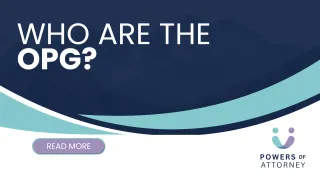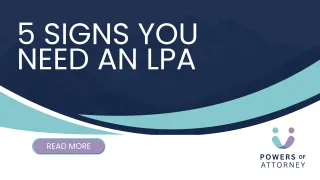News and Information

Who are the OPG?
Wondering who the OPG are and what they do? This article explains the role of the Office of the Public Guardian and why they’re central to the LPA process. ...more
Lasting Powers of Attorney
April 03, 2025•2 min read

5 common LPA questions
Got questions about Lasting Powers of Attorney? This quick guide answers five of the most common queries to help you understand how LPAs work and why they matter. ...more
Lasting Powers of Attorney
April 02, 2025•3 min read

5 Signs You Need An LPA
Not sure if you need a Lasting Power of Attorney? Here are five signs it’s time to put one in place and protect yourself and your loved ones from future uncertainty. ...more
Lasting Powers of Attorney
April 01, 2025•3 min read
TESTIMONIALS

Jane Doe
"This website provided all the information I needed and when I was ready, they helped me with putting the documents in place".

John Doe
"A great source of information for LPAs. Thanks to Sophia and the team for their guidance."
FAQS
What is an Lasting Power of Attorney
A Lasting Power of Attorney is a legal document that allows someone you trust (your ‘attorney’) to make decisions on your behalf if you lose the ability to do so yourself.
Why would I need an LPA?
An LPA ensures your wishes are respected and important decisions are made by someone you trust if you're ever unable to make them yourself due to illness, injury, or age.
Who are the Office of the Public Guardian
The OPG is a government body that oversees LPAs and ensures attorneys act in your best interests.
What's a Deputyship Order?
A deputyship order is a legal document issued by the Court of Protection in England and Wales. It gives one or more people (called deputies) the legal authority to make decisions on behalf of someone who lacks the mental capacity to make those decisions themselves.
Is an LPA only for older people?
No. Anyone over the age of 18 can make an LPA. It’s about planning ahead—accidents or illness can happen at any age.
What's the difference between the two LPAs?
There are two types:
Health and Welfare LPA – covers decisions about medical treatment, care, and living arrangements.
Property and Financial Affairs LPA – covers decisions about money, bills, property, and bank accounts.
Do I need both LPAs?
That depends on your situation, but many people choose to have both to ensure all areas of their life are covered.
How do I create an LPA?
You’ll need to complete the official forms, have them signed and witnessed correctly, and then register them with the Office of the Public Guardian (OPG).
Do LPAs need to be registered?
Yes, they must be registered with the OPG before they can be used. This applies to both types of LPA.
How long do LPAs take to register?
Registration usually takes around 8 to 10 weeks, depending on the OPG’s workload.
How much does it cost to register an LPA?
It costs £82 per LPA to register in England and Wales. Some people may qualify for a fee reduction or exemption.

